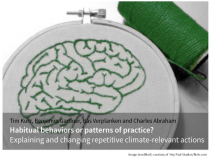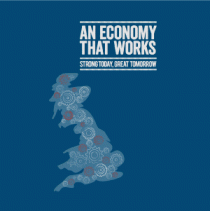- About
- Team
- Projects
- Children and the Environment
- ELiCiT (Exploring lifestyle changes in transition)
- Foundations for Sustainable Living
- HABITs
- Mapping Rebound Effects
- PASSAGE (Prosperity and Sustainability in the Green Economy)
- Policy Dialogue
- Price Responsiveness of Demand in Energy
- Resilience and Sustainable Lifestyles
- Sustainability Transitions in Food Systems
- Sustainable Living in Remote Rural Scotland
- Publications
- News
- Events
Publications
Found 41 results
Filters: Filter is [Clear All Filters]
. Who rebounds most? Estimating direct and indirect rebound effects for different UK socioeconomic groups. slrg-wp-01-14.pdf (3.36 MB)
slrg-wp-01-14.pdf (3.36 MB)
. Who rebounds most? Estimating direct and indirect rebound effects for different UK socioeconomic groups. Ecological Economics. 2014;Volume 106:12–32. Available at: http://www.sciencedirect.com/science/article/pii/S0921800914002055.
. Well-being and Sustainable Development. In: Oxford Handbook of Happiness. [Editors: S David. I Boniwell and A Conley]. Oxford Handbook of Happiness.; 2013:498-517.
. Wachstum rettet uns nicht. Der Tagesspiegel. http://www.tagesspiegel.de/zeitung/wachstum-rettet-uns-nicht-/7348934.html. Published 2012.
. Unravelling the Threads: Discourses of Sustainability and Consumption in an Online Forum. Environmental Communication . 2012; 6/01:101-118.
. Understanding transition-periphery dynamics: renewable energy in the Highlands and Islands of Scotland . Environment and Planning. 2013;45(3):691-709.
. UK Youth: The conflicts of contemporary lifestyles. United Nations Environment Programme; 2011. dtix1321xpa-visionsforchange_report.pdf (9.46 MB)
dtix1321xpa-visionsforchange_report.pdf (9.46 MB)
. Turning lights into flights: Estimating direct and indirect rebound effects for UK households. Energy Policy. 2013:234–250. Available at: http://www.sciencedirect.com/science/article/pii/S0301421512010531.
. Time, gender and carbon: A study of the carbon implications of British adults' use of time. Ecological Economics . 2012;84. Available at: http://www.sciencedirect.com/science/article/pii/S0921800912003709.
. Sustaining trajectories towards sustainability: dynamics and diversity in UK communal growing activities. Global Environmental Change. 2013;23(5):838–846. Available at: http://www.sciencedirect.com/science/article/pii/S0959378013001039.
. Sustainable consumption and lifestyles? Children and youth in cities . In: World Social Science Report. World Social Science Report. OECD Publishing and Unesco Publishing; 2013:357-364. doi:10.1787/9789264203419-60-en.
. Societal transformations for a sustainable economy. Natural Resources Forum. 2011; 35:155-164.
. Prosperity without growth. In: Growth in transition. [Editors: F Hinterberger, E Freytag, E Pirgmaier and M Schuster]. Growth in transition. Abington/New York: Earthscan/Routledge; 2012:62-65.
. Prospérité sans croissance: comment faire? . Constructif. 2012;31(01/2012). Available at: http://www.constructif.fr/bibliotheque/2012-2/prosperite-sans-croissance-comment-faire.html?item_id=3137.
. Productivity and Work in the New Economy – Some Theoretical Reflections and Empirical Tests. Environmental Innovation and Societal Transitions. 2011;01/01:101-108. doi:http://dx.doi.org/10.1016/j.eist.2011.04.005.
. Pluralising Progress: from integrative transitions to transformative diversity. Journal of Environmental Innovation & Societal Transitions. 2011;1:82-88.
. New Motherhood: A moment of change in everyday shopping practices?. Young Consumers. 2014;15(3):211 - 226. Available at: http://www.emeraldinsight.com/doi/abs/10.1108/YC-11-2013-00411.
. Multicritria Diversity Analysis: theory, method and an illustrative application. In: Handbook on Sustainable Use of Energy. Handbook on Sustainable Use of Energy. Edward Elgar; 2011.
. Multicriteria Diversity Analysis: a novel heuristic framework for appraising energy portfolios. Energy Policy. 2010;38:1622-1634.
. Missing carbon reductions? Exploring rebound and backfire effects in UK households. Energy Policy . 2011;39:3572-3581. 2011_druckamn_et_al_rebound_energypolicy.pdf (569.29 KB)
2011_druckamn_et_al_rebound_energypolicy.pdf (569.29 KB)
. Living up to expectations: estimating direct and indirect rebound effects for UK households. 2015;1. wp_15-01_living_up_to_expectations.pdf (1.46 MB)
wp_15-01_living_up_to_expectations.pdf (1.46 MB)
. Let's be less productive. The New York Times. http://www.nytimes.com/2012/05/27/opinion/sunday/lets-be-less-productive.html. Published 2012.














